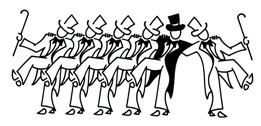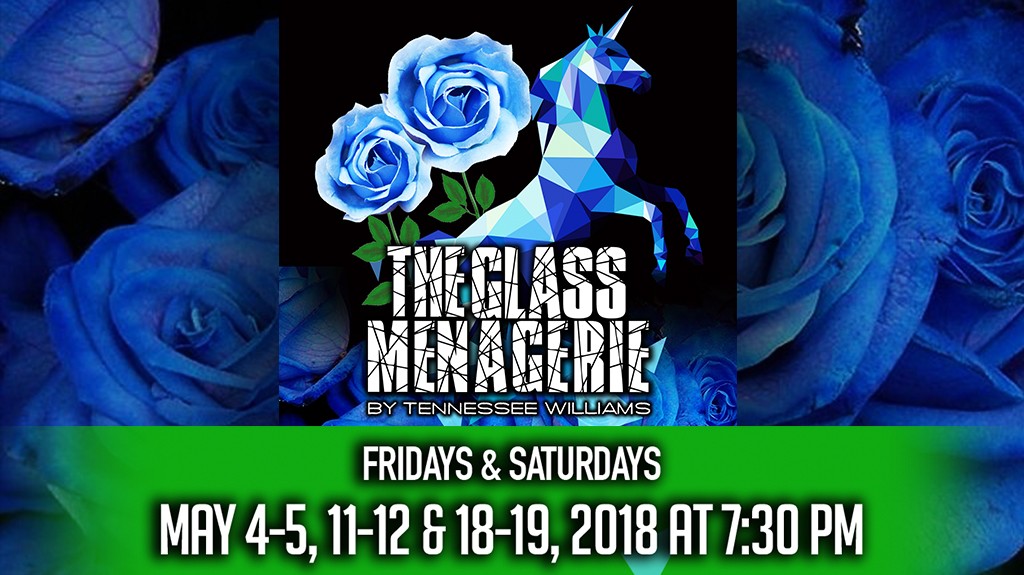Continuing its 40th Anniversary Season of timeless classics—Jean-Claude van Itallie’s Interview (at the Elgin Fringe Festival), Thornton Wilder’s Our Town, and Moliere’s Tartuffe— INDEPENDENT PLAYERS presents one of the most famous plays of the modern theatre, Tennessee Williams’ The Glass Menagerie. This American theatre masterpiece will be performed May 4-5, 11-12, and 18-19, 2018 at 7:30 PM at the Elgin Art Showcase, (on the 8th floor of the Professional Building), 164 Division Street, Elgin.
This production is being directed by Mark Steensland, who has either directed or acted in 30 shows in previous seasons for IP. Steensland’s cast consists of four IP veteran actors—Angela Douglass, Gabor Mark, Diane McFarlin and Justin Schaller— who have collectively acted in 20 IP productions and worked extensively with numerous other theatre companies throughout the Chicagoland area. Needless to say, we are delighted to have them back working with us once again.
This memory play, which premiered in 1944, has strongly autobiographical elements, featuring characters based on Williams himself, his histrionic mother and his mentally fragile sister Rose. In writing the play, Williams drew on an earlier short story, as well as a screenplay he had written under the title of The Gentleman Caller. The play premiered in Chicago in 1944. Local critics championed it, helping build enthusiasm which eventually drew audiences which convinced its producers to move the play to Broadway where it won the New York Drama Critics Circle Award of 1945. It is a drama of great tenderness, charm and beauty, which became his first successful play; it catapulted Williams from obscurity to fame, and he went on to become one of America’s most highly regarded playwrights.
Even though the plot of this play is familiar to some, for those to whom it isn’t, here goes: “Amanda Wingfield is a faded, tragic remnant of Southern gentility who lives in poverty in a dingy St. Louis apartment with her son, Tom, and her daughter, Laura. Amanda strives to give meaning and direction to her life and the lives of her children, though her methods are ineffective and irritating. Tom is driven nearly to distraction by his mother’s nagging and seeks escape in alcohol and the unrealistic world of the movies. Laura also lives in her own illusions. She is crippled, and this defect, intensified by her mother’s anxiety to see her married, has driven her more and more into herself. The crux of the action comes when Tom invites a young man of his acquaintance to take dinner with the family. Jim, the caller, is a nice ordinary fellow who is at once pounced upon by Amanda as a possible husband for Laura. In spite of her crude and obvious efforts to entrap the young man, he and Laura manage to get along very nicely, and, momentarily, Laura is lifted out of herself into a new world. Toward the end, when Jim explains that he is already engaged, this ‘new world’ comes to an abrupt halt. The world of illusion that Amanda and Laura have striven to create, in order to make life bearable, collapses about them. Tom, who is at the end of his tether, leaves home.”
To enhance viewing The Glass Menagerie, the following are some interesting insights into Williams and his memorable first great success. The characters and story mimic Williams’ own life more than any of his other works. Williams, whose real name was Thomas, closely resembles Tom, as his mother resembles Amanda. His sister Rose provides the basis for Laura (whose nickname in the play is “Blue Roses,” a result of a bout of pleurosis as a high school student), but some commentators believe she may incorporate aspects of the playwright himself—his introverted nature and obsessive focus on one aspect of life (writing for Williams, the glass menagerie for Laura). Symbolically, the glass menagerie represents Laura’s nature because, like the glass figures, she is delicate, unique and beautiful to those who know how to see her. Of all the figures, the unicorn is particularly meaningful because it represents Laura’s unusual persona and her loneliness; when it breaks, it is no longer unique but, rather, just like any other glass horse. In the end, when the gentleman caller (Jim) shatters Laura’s hopes of finding love, she becomes, like the unicorn, alone in a world of girls who are not shy and clearly not unique.
Harold Clurman, internationally known critic and director has written extensively about the plays of Tennessee Williams, so let’s take a look at some of the most pertinent things he says about Williams and The Glass Menagerie:
“Williams has always felt himself a dweller in Hart Crane’s “broken world,” fearing those personal and social sins that render life infernal: falsity, cruelty, corruption, violence, and the even greater fears of age and death. Like Dylan Thomas, Williams might also be said to “rage against the dying of the light” (“Things,” as Amanda says in The Glass Menagerie,”have a way of turning out badly.”), but Williams does not rage so much as depict.”
“So much of Williams’ writing is characterized by the opposition of powerful forces or states of Being. Realism and magic; apprehension and hope; attraction and disgust.”
“No one in American drama has written more intuitively of women than Williams. But they are special women. Their fragility is symbolized in the very title and image of The Glass Menagerie. The animal loved most by Laura, the be-lamed and desperately withdrawn guardian of the “menagerie,” is a unicorn, an oddity among those breakable creatures, whose unique feature, its single horn, gets to be clumsily shattered. And Amanda, Laura’s mother, with her memory or dream of a more decorous age, is as hurt, as isolated, and as fragile as her daughter.”
“What defeats so many of Williams’ women as well as several of his men, apart from the unresolved tug of war between body and soul? They are “soft people”—men and women of overtender sensibility, unarmed against callousness. We may discover, in this, another facet of Williams’ perception, a further dimension. Williams is also a social playwright, though by no means a “propagandist.” The “social” in his writing is inherent in his portraiture.”
“Williams has an uncanny ear for living speech as different types of people express themselves. His dialogue is effortlessly euphonious, rich in subtle gradations of the vernacular in the mouths of both the educated and the ignorant. No one in our theatre has written more melodiously. Without the least artificial flourish, his writing takes flight from the naturalistic to the poetic.”
“Musical and sound effects are used to project moods and to support and intensify the line of action. When I [Clurman] once complimented Williams on this, he smiled and said, “It is sentimental, but it is one of the reasons which has made me a popular playwright.”
“Highly theatrical, too, is his use of color, light, and the entire panoply of elements which make for “theatre.” Read his stage directions!”
“Williams’ stage directions for actors, while often melodramatic, are constantly illuminating. So, too, is the “color” contrast among the characters: … the family of “romantics” (Tom, Laura, Amanda) in Menagerie, complemented by the endearingly commonplace Gentleman Caller.”
A quick footnote to all of this: Clurman’s statement above in which he states that his characters are often “soft people,” people of “overtender sensibility,” always makes me remember the time I was at a cast party at which Williams was also a guest, and I came away from hearing him speak about his work and his life that he, himself, was a man of “overtender sensibility.” He was one of the kindest people I have ever met!
Join us in May to experience this magnificent theatrical masterpiece live and up close at the very intimate Elgin Art Showcase. It looks to be an experience you won’t soon forget.


